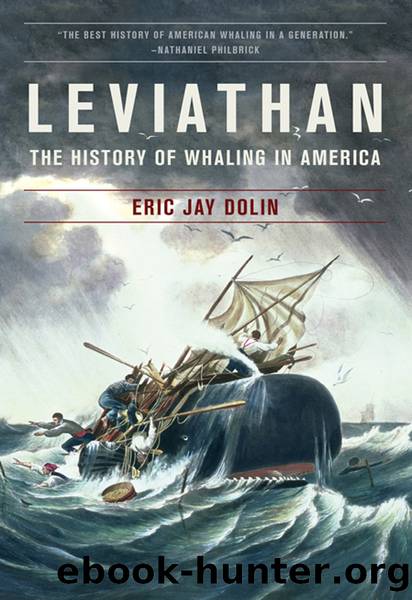Leviathan by Eric Jay Dolin

Author:Eric Jay Dolin
Language: eng
Format: epub
Publisher: W. W. Norton & Company
Published: 2007-08-14T16:00:00+00:00
Chapter Fourteen
“AN ENORMOUS, FILTHY HUMBUG”
A PICTURE FOR PHILANTHROPISTS, THIS NINETEENTH-CENTURY PRINT SHOWS THE HORRIFIC AND INCREDIBLY PAINFUL PUNISHMENT OF BEING WHIPPED WITH THE CAT-O’-NINE-TAILS, WHICH LEFT THE RECIPIENT BLOODY BUT NOT ALWAYS BOWED.
DURING THE GOLDEN AGE TWO IMAGES OF THE WHALING LIFE competed with each other. There were those who saw it as an exciting and even romantic enterprise, most often because they were considering it from the safety of their own homes and had neither experienced the rigors of whaling, nor knew anyone who had. Then there were others who had a decidedly darker image of the profession. The author of the following passage, written in 1835, clearly falls into the first camp. “’Tis high time you were aware that few voyages…can boast of greater attractions than a ‘whaling cruise’ offers to the nautical lounger, the novelty-monger, the devotee of exciting sports—the anything, or anybody, in short, who, like the Venetian Doges of yore, is in any degree ‘wedded to the imperial sea.’”1 Another contemporary writer saw whaling as a noble pursuit that could help men throw off the oppressive shackles of modern life, which forced them to earn their keep in menial jobs, and instead reinvigorate their character, satisfy their wild side, “gather wealth in the face of danger, and snatch subsistence from the impending jaws of death.”2
The contrasting view, offered primarily by ex-whalemen, and in particular those who labored before the mast, painted whaling in far less glowing terms. To them whaling was a mean and singularly unprofitable line of work. After reflecting on four years at sea, whaleman William B. Whitecar, Jr., politely concluded “by advising all young men who can gain a livelihood ashore, to stay at home.” Ben-Ezra Stiles Ely wrote to assure those who were contemplating a whaling cruise, “that a life on the ocean wave is generally one of many hardships, and of few bright prospects. It demoralizes most persons who devote themselves to it; and raises but a few to nautical eminence, honour and wealth. Generally they who live on the sea have but a short life; and nine hundred and ninety-nine out of a thousand of them are but poor Jack Tars at last.” Charles Nordhoff was a little less genteel, stating succinctly that whaling was “an enormous, filthy humbug.” And George Whitefield Bronson offered a particularly harsh assessment, observing that “whalemen, as a class, have been too long neglected. Too many ships that float are in reality prison-ships;—their crews-for the time being-perfect slaves. White slavery exists this side of Algiers. There are Legrees in spirit—and as far as power extends, in practice—north of the sugar fields of Louisiana. Uncle Tom has many nephews on the sea. We hope some gifted mind will soon faithfully and fully exhibit the interior of ‘jack’s’ cabin.”3
To determine which view is closer to the truth, one cannot simply split the difference. While whaling did have its thrilling moments, these were overshadowed by the inescapable fact that whaling was, during most of the golden age, a miserable pursuit, and the average whaleman’s lot was depressing.
Download
This site does not store any files on its server. We only index and link to content provided by other sites. Please contact the content providers to delete copyright contents if any and email us, we'll remove relevant links or contents immediately.
| Fisheries & Aquaculture | Forests & Forestry |
The Lonely City by Olivia Laing(4118)
Animal Frequency by Melissa Alvarez(3752)
All Creatures Great and Small by James Herriot(3512)
Walking by Henry David Thoreau(3233)
Exit West by Mohsin Hamid(3181)
Origin Story: A Big History of Everything by David Christian(3137)
COSMOS by Carl Sagan(2949)
How to Read Water: Clues and Patterns from Puddles to the Sea (Natural Navigation) by Tristan Gooley(2851)
Hedgerow by John Wright(2775)
The Inner Life of Animals by Peter Wohlleben(2765)
Origin Story by David Christian(2683)
How to Read Nature by Tristan Gooley(2662)
Project Animal Farm: An Accidental Journey into the Secret World of Farming and the Truth About Our Food by Sonia Faruqi(2658)
How to Do Nothing by Jenny Odell(2643)
A Forest Journey by John Perlin(2585)
Water by Ian Miller(2580)
The Plant Messiah by Carlos Magdalena(2453)
A Wilder Time by William E. Glassley(2362)
Forests: A Very Short Introduction by Jaboury Ghazoul(2335)
